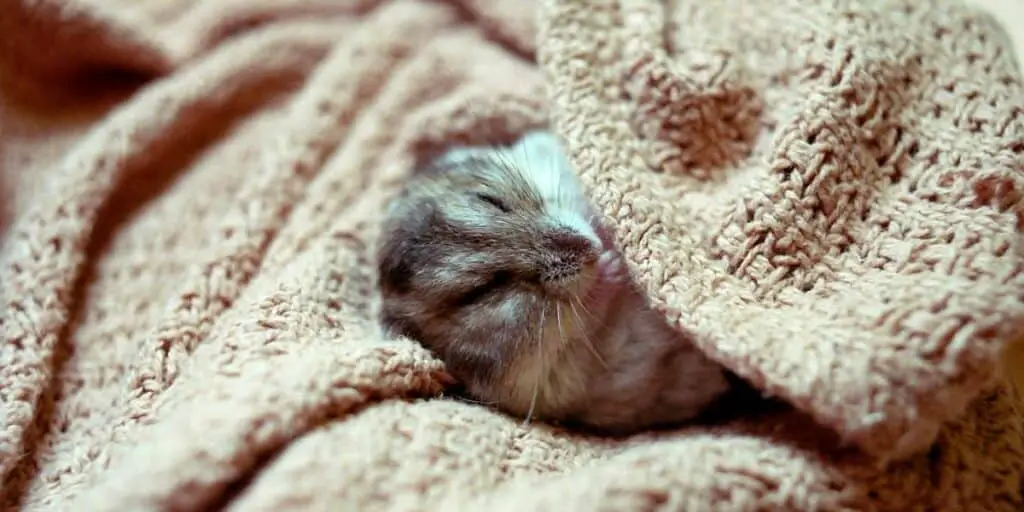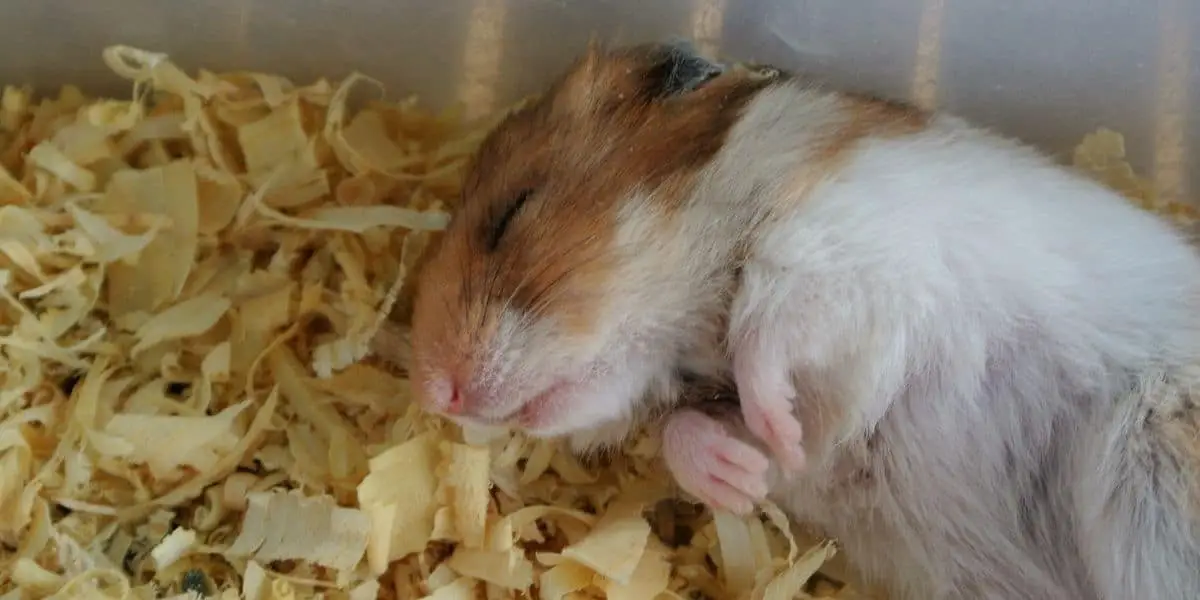Your pet hamster is a fluffy, golden furball of happy energy. He loves to play and he provides you with hours of delight as you watch him scurry around his house, run on his wheel, or crawl through his toys and tubes.
It’s fun to watch him dig around in his cage, groom himself, and stretch his little limbs.
Sometimes, though, your hamster might shock you if you find your normally active pet lying still in his cage.
But then you gently pet him or stroke the tips of his whiskers, he stirs a bit. He’s alive!
Do hamsters play dead? Yes, they do.
Table of Contents
What’s it called when he plays dead?
Most of us just call it “playing dead,” or “playing possum,” but the technical term is thanatosis. Thanatosis is a state that your hamster can achieve that resembles shock or death. When he does this he halts his voluntary body activity and often assumes a posture that makes him appear to be dead.
You know that possums are famous for this, but it’s also done by some insects, birds, reptiles, and rodents.
Why does your hampster play dead?
Playing dead is an instinctual defense mechanism that’s built into your hamster’s DNA. You don’t want to see your hamster playing dead because it’s a sign that for some reason he’s experiencing extreme anxiety.
People only started breeding hamsters as pets around 1939. Before then, they lived in the wild where they had to dodge predators like snakes and birds of prey.

Hamster predators prefer their meals to be alive and moving, so it made sense for hamsters to develop the ability to appear dead in order to protect themselves. This was particularly important when they were away from a hiding spot.
Can you make a game of playing dead?
You love to interact with your hamster. He’s a curious little pet, and it’s not unusual for him to watch you with his ears erect. He loves to see what’s going on and watch the world around him.
Hamsters are skittish, though, so you want to help them keep calm. Some hamsters are so easily frightened that they will play dead when you do something as innocent as pointing a “finger gun” at them.
This might get a laugh, but it’s a bad idea because you’re creating tremendous anxiety in your hamster. Too much anxiety can lead to diseases and even death.
How to tell if your hamster is anxious?
One of the cute things about hamsters is that they are very expressive and love to communicate. Their communications, however, are not verbal so you have to pay attention to their body language.
Here are some ways to tell if your hamster is experiencing anxiety by just looking at him and without him having to start playing dead:
- If your hamster stands up on his hind legs and puts his dukes up, he’s telling you that he’s feeling threatened and that he wants you to back away.
- If his ears are forward, his cheeks are puffed up, and his mouth is open, he’s letting you know that he’s frightened of something and wants you to take it away.
- If he empties his cheeks quickly and scurries away to hide he’s saying that he’s feeling insecure about the situation and would like you to fix it.
- If he’s acting shy and maybe hiding a lot, he’s telling you that he’s something or someone is stressing him out, like loud noises or perhaps over-active children or adults
- If his teeth are chattering, he’s warning you that he’s ready to fight and that you’d better stay away.
- If he gets startled when you approach, it means that right now he’s feeling insecure about whatever’s going on.
- If his ears are laid back and his eyes are narrowed, he’s saying that’s he’s suspicious and a little nervous.
- If he is creeping along the sides of his cage, it shows that he’s unsure of his surroundings. This isn’t unusual when he’s in a new home because he’s getting his bearings and trying to figure out what’s what.
- If he lies on his back and shows his teeth, it means that he’s feeling threatened and frightened, and warning you that he’s ready to fight.

What to do if your hamster is anxious?
It’s easy to help relieve the situation if you see that your hamster is suffering anxiety. If he’s in a fighting mode, you should probably wait until he calms down because you don’t want to over-stress him by escalating the situation.
In all other cases, there are two simple things you can do to make his life calmer and more enjoyable.
- Remove the cause of your hamster’s anxiety. If there’s something new in his cage or significant changes in the environment outside his cage, try to eliminate these stressors by either taking the new stuff out of the cage or maybe moving the cage to another part of your home.
- If he’s exhibiting anxiety when he’s outside his house, you should gently scoop him up and put him back inside his home. Sometimes it’s helpful to put him inside one of his tunnels where he can feel safe and cozy.
Conclusion
Yes, hamsters can play dead but you really don’t want yours to become so anxious that it does. You can tell when he’s anxious and can easily relieve his anxiety.




